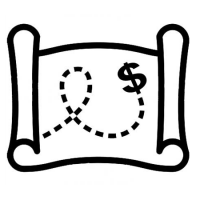EPISODE 72~ TOP TIP: If You Don’t Have Dependents, You Don’t Need Life Insurance.
Salespeople will try to sell it to you anyway, but Life insurance benefits are just meant to support family members when one of the breadwinners dies. That’s why if you don’t support anybody else financially, you don’t NEED this coverage. You may want to start a policy for the future, because the premiums are cheaper when you’re younger and healthier, but don’t let anybody tell you you need it. The one exception is if you are getting tested for a dangerous health condition like the BRCA 2 breast cancer gene. Unlike health insurers, life insurers ARE allowed to raise your rate or deny you coverage based on pre-existing conditions, so in order to qualify for a policy, you should get life insurance before you’re tested. You get to keep that policy if you test positive. You can drop it if you test negative. Make sense?
EPISODE 72 ~ MAKE MORE: Choose a Great Cash Back Credit Card That Makes You Money!
First, a caveat: it’s important to carry credit cards that fit your lifestyle. So people who carry a balance should get the lowest interest rate cards they can. But once those cards are paid off, you want to switch to cards with the richest possible rewards.
When I was at Good Morning America I did a savings makeover on a couple named Mike and Kim Strickland. They had had credit card debt in their 30s, but as they prospered in life and career, they had paid all of that off. And yet they weren’t taking advantage of the opportunity to snag a cash back credit card with decent returns. Instead, they were messing around with a couple of their old low-interest, no frills cards. And they also had a card that offered trinkets and miles that they never redeemed.
That is SO typical and if you know you’re the type of person who’s not going to book a vacation early enough to use miles or not going to shop on the special credit card site to buy products with your miles, you should go for cash back. For the Stricklands, I found a card that paid 5 percent cash back on certain purchases and 1 percent on the rest. The card also had no annual fee, which was a huge improvement over the $395 a year they were paying for their main card. If the Stricklands continued to spend the same amount on their credit cards that they had for years, I calculated that they would make $1,599 a year in cash back EVERY year with their new card. Nice!
I can’t tell you which cash back credit card to choose because it depends on your lifestyle. If you spend the most on groceries and gas, you’ll want a card that rewards you for that. If your big ticket items are home improvement stores or dinners out, choose a card that rewards those. You see? Luckily, there ARE websites that help you find the ideal cash back credit card for you. And I will link you to a few of these handy free resources from EasyMoneyShow.com/72. Be sure to scour their entire lists, rather than just the credit cards at the top, because some sites take money to highlight certain cards more prominently and you may find your ideal card lower on the list.
LINK: Websites that help you find the ideal cash back credit card for you.:
www.creditcards.com/cash-back/
www.creditkarma.com/credit-cards/cash-back-cards
wallethub.com/cardadvisor/
EPISODE 72~ SAVE MORE: Save a Bundle on Avoiding Junk Title Fees When Buying a House!
When you buy a house, you already feel overwhelmed by how much money you’re parting with. But then, at the settlement table, what’s this? They’re asking you for even MORE money in title fees?
Junk title fees are our featured save more segment of this podcast, because if you dodge them you can save a bundle. My guest is Carolyn Warren, Author of the bestseller Mortgage Ripoffs and Money Savers and also Homebuyers Beware and a working mortgage broker herself. Welcome back to Easy Money, Carolyn.
Carolyn, first explain who a title agent is in the home-buying process and briefly what title insurance is.
Most home buyers don’t shop around for title services. Why should they?
Federal lending law states that the choice of title company belongs to the Buyer. However, when a listing agent places the home on the Multiple Listing Service, he/she includes the legal description of the property, and they get that from the title company. Thus, the listing agent chooses a title company right from the start.
No actual work has yet been done by that title company, so at this point, it is no problem to switch companies. There is no reason you can’t say, “I’d like to use Y Title,” even though the listing shows X Title. Truly, it’s no problem.
What are some examples of bogus title fees?
there shouldn’t be double-charges. Such as a messenger fee and an overnight fee. Both of those fees are to transport the signed docs back to the lender. Which are you using, a messenger or FedEx overnight? And why are you charging $75 when Fedex overnight by 10:30 am (2 lbs) is $28.05? 3 lbs is $31.40.
How can people find out what different title companies charge?
Use Google to search for your title company + zip code. Some companies have a fee calculator on their site you can use. For the others, call and ask. You don’t need a written quote. The title agent can provide the quote over the phone in just a few minutes.
Do you recommend people go with a Title company that charges one flat rate or one that itemizes the charges?
Some charge one flat fee. Others add a couple junk
fees. Some pile on a stack of fees that may add up to an extra $300 to $700. The ones who charge multiple fees say, “We like to break it down for the buyer, so you know where everything goes.”
That sounds fine, but when the total of the break-down is significantly more than the flat-fee company, something is fishy.
Sometimes a Title company agent performs your actual closing. Other times it’s an attorney or an escrow agent, depending where you live. Do those folks also sometimes add on junk fees?
* Archive or filing fee (You shouldn’t pay extra for their filing system. That is part of being in business.)
* Courier or messenger fee (Getting the signed documents back to the lender is part of what the closing agent’s large fee should cover. Moreover, FedEx and UPS, the services most agents use now, charges about $40 to overnight documents, so they shouldn’t show a padded fee of $60 – $100, as they often do.)
* Document preparation fee (Preparing the closing Settlement Statement and a handful of other boiler plate forms is what their main big fee covers. Adding this is redundant and borders on dishonest, in my opinion.)
* Email or edoc fee (They don’t need to charge you $50 to $150 to receive the documents from the lender by email. That is part of their normal job.)
Wire fee (While banks do charge a nominal fee to wire funds, none of the good settlement agents tack on this fee for their clients. They figure it is part of what their big fee covers.)
I always recommend that people ask for their final mortgage paperwork, including the FINAL title fees 24 to 48 hours in advance of their closing, so there are no last minute surprises and there’s time to fight last minute fees. Is that good advice?
It is now mandatory that the lender provide you with the Closing Disclosures (called the CD) three days before signing. The CD shows all the details of your loan, including a list of fees. If you see an error, you have those three days built in for it to be corrected.
To give people some motivation to shop around for title services and scrutinize these fees, how much money, in total, have you seen people charged in junk fees?
I once saw somebody charged nearly $800 in junk fees.
EPISODE 72~ FIND YOURS: Have You Appeared on Film, Television, or Radio? You Could Have Unclaimed Money!
It is the SAG-AFTRA union’s unclaimed residual database. I actually belong to this union because of my longtime TV career. Residuals are like royalties and are paid to performers or others when a show is syndicated and makes additional money elsewhere. For example, I have been the Dr. Oz Show’s consumer and investigative correspondent for several years now. If stations buy re-runs of Dr. Oz or if foreign countries pay to air the show, I get a residual for any time I appeared. Sometimes it’s 23 cents. Others it more like $230 dollars. Either way, I’ll take it. I’m a geek. I even cash the 23 cent checks.
If you or a loved one has worked in film, TV or radio, you should do a quick search. What I like about the SAG-AFTRA unclaimed residual database is that you can search by first name or last name —which is especially helpful if you’ve gone by more than one name such as a stage name or a married name. You can also search partial first and last names, which is great if there’s a common misspelling of your name.
I found nothing under Leamy, but found a couple dozen Elisabeth’s with an “S” instead of a Z, the way I spell my name. I mention this because it shows how robust the system is. Of course, there were hundreds of Elizabeth’s with a Z.
The SAG-AFTRA website says, quote: “You may be due residuals as a performer, loan out, or as a beneficiary/heir of a performer. If the Union is holding Unclaimed Residuals, it is because we can’t locate you. We may not have current or updated information in our database or we may not know you are the rightful beneficiary/heir.”
If you don’t find something at first but feel there ARE residuals for you and yours out there, search again! The database is updated DAILY! And I will link you to it from EasyMoneyShow.com/72.
LINKS: To search for unclaimed SAG-AFTRA film, television and radio residuals, go here: www.sagaftra.org/unclaimed-residuals
EPISODE 71~ EASY MONEY PODCAST
EPISODE 71~ TOP TIP: SCAM ALERT: Be Aware of ‘Sliding’ When Buying Car Insurance
When you purchase car insurance, beware of a sleazy tactic called “sliding.” That’s when an insurance agent slides extra coverage into your policy that you didn’t request. Roadside assistance, rental car coverage –things like that. The agent may claim the coverage is free or try to sneak it in. Often the coverage only costs a few bucks a year, but it adds up and the agent pockets more commission. Truly bold agents have been known to tell customers the extra coverage is required by law. Here’s a great and little known resource for all insurance questions: Check with your state insurance commissioner to see what kinds of coverage really ARE required. And if you have a complaint about any type of insurance, you can file a complaint with your state insurance commissioner and they will dole out justice pretty fast and furious I have found.
EPISODE 71 ~ MAKE MORE: Increase Your Income by Understanding Your Boss’s Hidden Motivations
I want to talk about how to make more money by understanding what REALLY motivates your boss. As you know, I try to make sure I include “make more” topics that are relevant to people who aren’t planning to go anywhere and want to make more money at their current jobs. I learned about this idea of understanding your boss’s hidden motivations from Stever Robbins. Stever is a Harvard MBA, a former CEO, an executive coach and host of the “Get it Done Guy” podcast. On Episode 44 I spoke with him about killer ways to ask for a raise and we touched on what motivates bosses, but didn’t get to explore it fully. So here’s more of my fascinating conversation with Stever.
I’ve heard you say if you meet your boss’s needs, you will be rewarded financially. What you do you mean by that?
You’ve heard managers say they’ll heap riches on those who do a good job. Ignore their words; watch their actions. Who do they really reward? Why? Mostly, we reward those who meet our needs, first and foremost. If you know what your managers really want, you can meet their needs while meeting the needs of the business.
Talk about the three motivations most bosses have and how to exploit them: power, affiliation and achievement.
The late Harvard psychology professor David McClelland had an easy framework you can use. McClelland said motivation comes in three flavors: power, affiliation, and achievement. Power People want things to happen their way. Affiliation People want to be popular and liked. And Achievement People want results. We’re all part power, part affiliation, and part achievement. Interestingly, we are taught that American business is all about achievement; it’s all that matters. But guess what—people don’t actually behave that way. They’re also driven by power and affiliation. “Working smart” means getting results, but even more, it means satisfying your boss’s needs for power and affiliation as well.
Do you actually bring up how you’re helping your boss with the 3 motivations when you ask for a raise?
we rarely acknowledge power and affiliation goals out loud. Those goals are considered unprofessional, even though they drive so many of us. So you need to frame your job in terms of achievement goals that will get you paid, while making it clear that you’ll meet your boss’s power and affiliation needs along the way. Trust me—as long as you’re helping a power-oriented boss expand their empire, you’ll be able to find a meeting of the minds about what you need to do to get paid and move ahead.
Notice that I’ve said very little about meeting the organization’s needs. That’s because only an executive who understands the link between their own needs and the organization’s needs will value your attempts to do the right thing for the business. In the final analysis, it isn’t between you and the company; it’s between you and the people who will promote and pay you.
That group consists of more than just your boss. Your boss’s boss and other senior managers may be watching. Your Power boss may report to an Achievement executive. If your efforts are visible to the exec, helping your boss achieve in a way that her boss recognizes might be your best strategy.
EPISODE 71~ SAVE MORE: The Power of 100 points, How Raising Your Credit Score Over The Crucial Threshold Can Save You BIG $$
On past podcasts, I have talked about slow, steady ways of improving your credit score like paying down bills and paying them on time. And I’ve talked about fast, flashy ways of improving your credit score, like becoming an authorized user on somebody else’s healthy account or asking creditors to delete single sins that are dragging your score down.
Now I want to talk about why you should go to the trouble to take those steps to raise your credit score if it’s not tip top. By tip top I mean 720 or above on a scale of 300 to 850. 720 is the base threshold for obtaining the very good interest rates on loans, whether for credit cards, car notes, mortgages or other loans. 740 or 760 get you even better deals. But let’s use 720 as our goal here.
Suppose you started out with a credit score of 620, which is about the lowest score you can have and still get a private mortgage with no government assistance. I did some research and a typical interest rate for somebody with a score of 620 might be about 6 and a half percent. BUT if you raise that score up to 720, you would qualify for a mortgage rate of just over 5%. About a point and a half less.
Now let me do a math comparison for you on a $300-thousand dollar mortgage. With the roughly 6 and a half percent interest rate you’d get with your 620 credit score, interest on your mortgage will cost you about $23,000 a year. If you raise your score to 720 and lower your interest rate to 5%, then your loan will cost about $20,000 a year in interest. So just by staking steps to raise your score, you will save $3,000 a year and nearly a hundred thousand dollars if you kept the mortgage for 30 years.
I did some math for an auto loan too, and I won’t go into all of the exact interest rates and prices here, but a score of 720 instead of 620 could save you nearly $3,000 over the course of a 3-year auto loan.
Here’s my favorite part about raising and then maintaining a high credit score: it’s free. All you have to do is use your current credit responsibly and you will save thousands of dollars on your future credit.
EPISODE 71~ FIND YOURS: How to Find Unclaimed Royalties Using a New Tool Called RoyaltyClaim.com
RoyaltyClaim.com was founded by music industry professor and consultant Dae Bogan. He says on his website: “I founded RoyaltyClaim, the world’s first search engine of unclaimed music royalties and licenses” to help “DIY musicians and rights-holders identify thousands of unclaimed entitlements. He says that in just a few months, scores of musicians have been able to find their missing money via the site “with one particular music producer uncovering nearly $150,000 in unclaimed royalties due to him.”
Bogan says the problem is that the music system is so complex —and I can attest to that, given that I’ve spent the last several episodes digging up a bunch of different potential sources of unclaimed royalties for musicians.
RoyaltyClaim attempts to bridge the many gaps by offering both free and paid searches of music royalties and also music licenses. One thing I like is that RoyaltyClaim allows musicians to search their name, but also to search other key words, like maybe the title of their most popular song.
I actually tried a free search of the site, looking for unclaimed royalties for my friend Tamara’s late beau, John. John was a prolific performer and producer. So I found 918,708 royalty records under his name just for the month of August 2018. And nearly a million more from September of 2017.
Now, I realize that you may not be a famous musician listening to Easy Money. But maybe you’re a superfan? Why not conduct a quick free search for your favorite artist and then fill them in on anything you find? It’s easy to reach out even to famous people via social media these days. And you’d be sharing good news.
LINK: Use RoyaltyClaim.com to search for unpaid music royalties: www.royaltyclaim.com/#pricing




